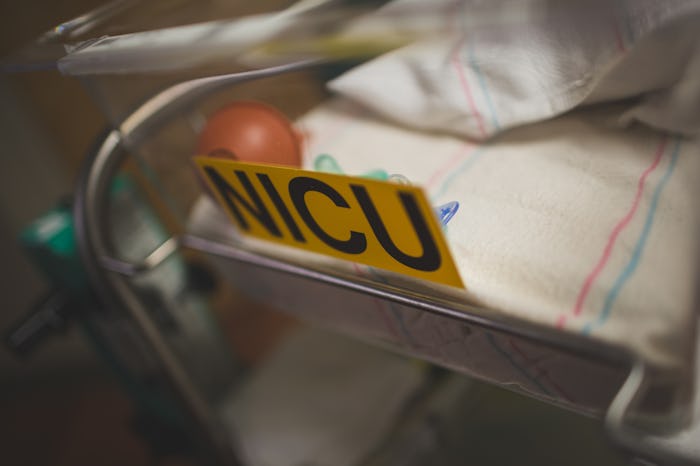Life

This Is How Having A Baby In The NICU Can Affect Your Mental Health
Adding a new baby to your life is, of course, exciting and nothing short of life-changing. But as any parents will tell you, shepherding little humans through this world also comes with its share of stressors. And, for parents of NICU babies, those facts become a reality before they ever step foot out of the hospital. It can take a toll, to say the least, and it might cause some parents to wonder how having a baby in the NICU affects your mental health. The truth is, it can be difficult.
"Having a premature baby is very stressful on a parent," Dr. Syeda Amna Husain, a board-certified pediatrician and founder of Pure Direct Pediatrics, tells Romper. "You’ve envisioned a healthy term newborn baby, and for a multitude of reasons, this wasn’t what happened after your baby’s delivery."
And there are a number of factors that go into the stress that parents undergo while their child is in the NICU, Husain says. In addition to the obvious concern for their child's health, parents will also find that the uncertainty of the situation — as well as sleep deprivation and feelings of missing out on bonding with and/or breastfeeding a new baby — will add to the emotional roller coaster. Not to mention the physical recovery that a mother experiences in tandem with her baby being in the NICU.
"All of these changes are so overwhelming to a mother who envisioned motherhood to be a particular way and is suddenly thrown into a world she never imagined," Husain says.
Not only can all of this feel stressful, but Dr. Kameelah Phillips, a New York-based OB-GYN and International Board Certified Lactation Consultant (IBCLC), says having a baby in the NICU can also be a risk factor for postpartum depression.
It's true: Up to 70 percent of new mothers who have a baby in the NICU will experience postpartum depression, according to a 2014 study published in the International Journal of Women's Health.
"Crying is absolutely normal and common, but if you start having intrusive thoughts of hopelessness, excessive crying, severe mood swings, withdrawal, anxiety, or other signs of severe depression you need to seek help immediately," Phillips tells Romper, adding that anxiety can also be a concern. "If you having anxiety, panic attacks, or increased restlessness this can be treated with behavioral and medical therapy."
Phillips also recommends taking time off from the NICU.
"You do not need to be there 24 hours a day in order to be a 'good mom'," she says. "Give yourself permission to go home, rest, and take care of yourself."
By taking care of yourself, Phillips says you will help pace yourself for the length of the NICU stay. "Being well rested helps you take care of yourself and the baby better," she says, adding that many NICUs have cameras that allow you to remotely check on your baby 24/7. "Use these cameras to reassure yourself that the baby is fine without having to physically be there."
Dr. Marianne Farag, the medical director of psychiatric emergency services at Trinitas Regional Medical Center, says it's also a good idea to allow other family members to help out by taking shifts to visit a baby in the NICU, so there is a shared responsibility.
"Speak openly about your feelings with your family and support system and make sure to keep these people close so that you are able to vent and express your sadness and frustration," she tells Romper, adding that speaking freely can help a mother to feel validated and understood.
It's for that same reason that Farag recommends treating the NICU staff as though they are family and an integral part of your baby's care.
"This will help a mother not see them as a foreign entity taking over her job as a mother," she says. "Instead, try to learn from them and let them in as caregivers and part of the team."
Husain also recommends NICU parents continue to connect with one another, whether it be over dinner or a simple coffee date to discuss non-NICU related topics. And avoid "Dr. Google," she says, opting instead for online NICU groups or groups within the hospital.
"This is a nice way to share big or small victories and obstacles with families who know what you’re experiencing," she says. "Every victory is worth a celebration."